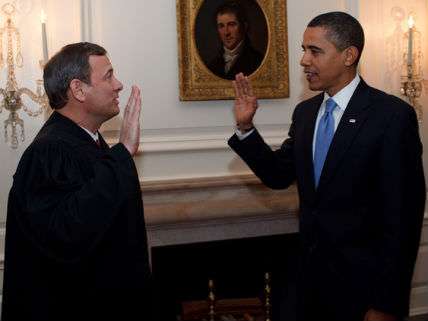Barack Obama vs. the Supreme Court
The president calls King v. Burwell an "easy case."

On April 2, 2012, barely a week after the U.S. Supreme Court finished hearing oral arguments in the Obamacare case National Federation of Independent Business v. Sebelius, President Barack Obama took to the bully pulpit in order to lecture the justices about how they should handle his health care law.
"For years," Obama said at a press conference, "what we've heard is the biggest problem on the bench was judicial activism, or a lack of judicial restraint. An unelected group of people would somehow overturn a duly constituted and passed law. Well," he declared, "this is a good example. And I'm pretty confident this court will recognize that and not take this step."
Did Obama's message resonate inside the chambers of the Supreme Court? It's possible that it did. Two months later, in his opinion upholding the constitutionality of Obamacare, Chief Justice John Roberts practiced the same sort of judicial restraint that Obama recently preached. "It is not our job," Roberts wrote, "to protect the people from the consequences of their political choices."
Three years have now passed and the future of Obamacare once again rests at the Supreme Court. By the end of June, the Court is expected to deliver its decision in King v. Burwell, the high-profile case that asks whether the White House violated the text of the Patient Protection and Affordable Care Act by allowing tax subsidies to issue to persons who bought insurance on federally established health care exchanges.
Speaking yesterday at a news conference at the G-7 summit in Germany, President Obama once again used his bully pulpit to lecture the Court about a pending Obamacare case. "This should be an easy case. Frankly, it probably shouldn't even have been taken up," Obama asserted. "It's not something that should be done based on a twisted interpretation of four words in—as we were reminded repeatedly—a couple-thousand-page piece of legislation."
Will the Court repeat history and rule once again in Obama's favor? It's conceivable that it will. After attending the King oral arguments back in March, I for one left the courtroom thinking the case was simply too close to call.
But it's also worth bearing in mind that this president's legal judgment is far from infallible. As I observed at the close of last year's Supreme Court term, "in the past month alone, the White House has suffered a series of embarrassing losses at the Supreme Court, where it failed to prevail on issues ranging from the scope of the Fourth Amendment to the limits of executive power. To make matters worse, the president lost all but one of those cases by a vote of 9-0." Furthermore, when it comes to specific areas of the law, such as property rights, the Obama administration's losing streak looks even worse.
To be sure, the president is entitled to his own opinion about what counts as an "easy" case. But given his administration's shaky legal record, that presidential opinion should always be taken with a grain of salt.


Show Comments (107)